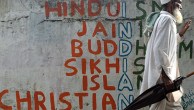
Religion in India: Tolerance and Segregation
Indians see religious tolerance as a central part of who they are as a nation. Across the major religious groups, most people say it is very important to respect all religions to be “truly Indian.”
Indians see religious tolerance as a central part of who they are as a nation. Across the major religious groups, most people say it is very important to respect all religions to be “truly Indian.”
In 2018, the global median level of government restrictions on religion – that is, laws, policies and actions by officials that impinge on religious beliefs and practices – continued to climb, reaching an all-time high since Pew Research Center began tracking these trends in 2007.
Over the centuries, the relationship between science and religion has ranged from conflict and hostility to harmony and collaboration, while various thinkers have argued that the two concepts are inherently at odds and entirely separate.
A median of 45% across 34 surveyed countries say it is necessary to believe in God to be moral and have good values. However, public opinion on this question, as well as the role of God, prayer and religion varies by country, region and economic development.
Globally, Muslims live in the biggest households, followed by Hindus, Christians, Buddhists, Jews and the religiously unaffiliated.
Household size and composition often vary by religious affiliation, data from 130 countries and territories reveals. Muslims and Hindus have larger households than Christians and religious “nones,” influenced in part by regional norms.
India is home to 1.4 billion people – almost one-sixth of the world’s population – who belong to a variety of ethnicities and religions. While 94% of the world’s Hindus live in India, there also are substantial populations of Muslims, Christians, Sikhs, Buddhists, Jains and adherents of folk religions. Here are five facts about religion in India.
Substantial shares of Americans of nearly all religious groups – as well as those who have no religious affiliation – say they meditate at least once a week.
The U.S. has more foreign students enrolled in its colleges and universities than any other country in the world. Explore data about foreign students in the U.S. higher education system.
Among the world's 25 most populous countries, Russia, Egypt, India, Pakistan, and Nigeria stand out as having the most restrictions on religion (as of the end of 2015) when both government restrictions and religious hostilities are taken into account.







